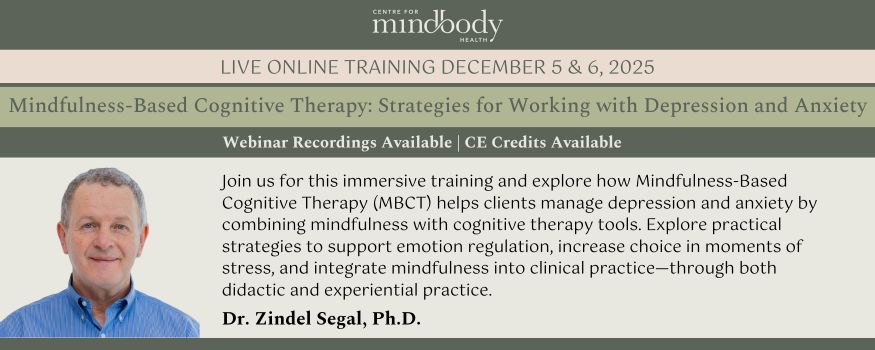Mindfulness-Based Cognitive Therapy: Strategies for working with Depression and Anxiety

Workshop Overview
Mindfulness meditation has been shown to disengage neural networks supporting rumination and worry, along with improving clinical outcomes through increased tolerance of negative affective states. By addressing transdiagnostic factors that increase risk for disorder onset and recurrence, training in mindfulness meditation can be employed with a host of physical and emotional disorders as means of providing individuals with greater choice during moments of reactivity and alarm. Yet our clients managing depressive and anxious disorders require more than just an on-ramp to practice meditation. For example, how does the practice of mindfulness sit alongside cognitive and behavioural interventions that have also shown to be of benefit, how do we language and guide mindfulness practices to respond to clinical concerns?
We will address these questions through the lens of Mindfulness Based Cognitive Therapy, an 8 week structured program that integrates mindfulness mediation with the tools of cognitive therapy for prevention of mood disorders. Combining didactic content with periods of experiential practice, we will examine how to integrate and appropriately sequence formal/informal mindfulness practices, identify somatic cues of emotional expression and set up a treatment frame where affect regulation based on ‘allowing’ and ‘letting be’ in contrast to cognitive reappraisal, can be encouraged. In these ways, clients can develop a different relationship to their depressive or anxious experiences, one marked by greater choice and agency.
Learning Objectives
Upon completion of this course, participants will be able to:
- Review the evidence base for mindfulness meditation in the treatment of depressive and anxiety disorders.
- Understand how to integrate and appropriately sequence formal/informal mindfulness practices into the psychotherapeutic treatment of Major Depressive Disorder.
- Engage in experiential practice of the 3 Minute Breathing Space and understand how brief changes in attentional focus can be used to address negative automatic processing cycles.
- Discuss why mindfulness is about more than relaxation.
- Learn about the role of sensory processing as an opponent process to cognitive elaboration.
- Review language and pacing when guiding mindfulness practices.
About the Presenter
Zindel Segal, PhD, is Distinguished Professor of Psychology in Mood Disorders at the University of Toronto Scarborough. An award winning clinical psychologist and continuously funded by the National Institutes of Mental Health, his program of research characterized psychological markers of relapse vulnerability in affective disorder which, in turn, provided an empirical rationale for offering training in mindfulness meditation to recurrently depressed patients in recovery. An author of over 10 books and 230 scientific publications, including The Mindful Way Through Depression and Better in Every Sense – guides for achieving mood balance in everyday life – Dr. Segal continues to advocate for the relevance of mindfulness-based clinical care in psychiatry and mental health.
Target Audience
- This workshop will be helpful to psychotherapists of all persuasions who recognize the significance of mindfulness practice in mental health and wish to integrate it into their practice.
- Therapists with personal experience of mindfulness who would like to understand the points of interaction between mindfulness meditation and clinical care.
- Clinicians seeking to base their therapeutic relationships and interventions on their personal mindfulness and contemplative practices.
- Therapists in search of a continuing education experience that is inclusive and accommodating to all identities and intersections thereof.
Webinar Recording
This webinar will be recorded and shared with all registrants and made available for 60 days once released.
For more information and to register, please click HERE.
Please contact us with any inquires at [email protected].
Accredited by the Ontario Psychological Association for 7 hours of continuing education.
